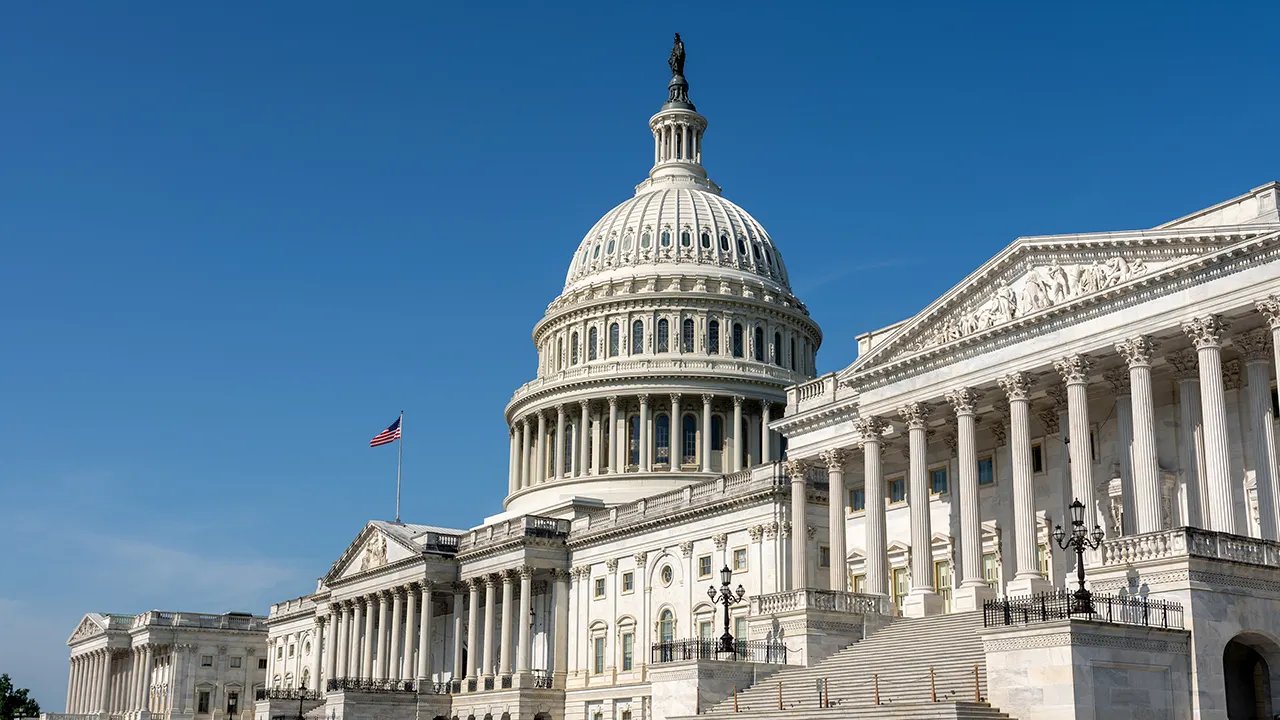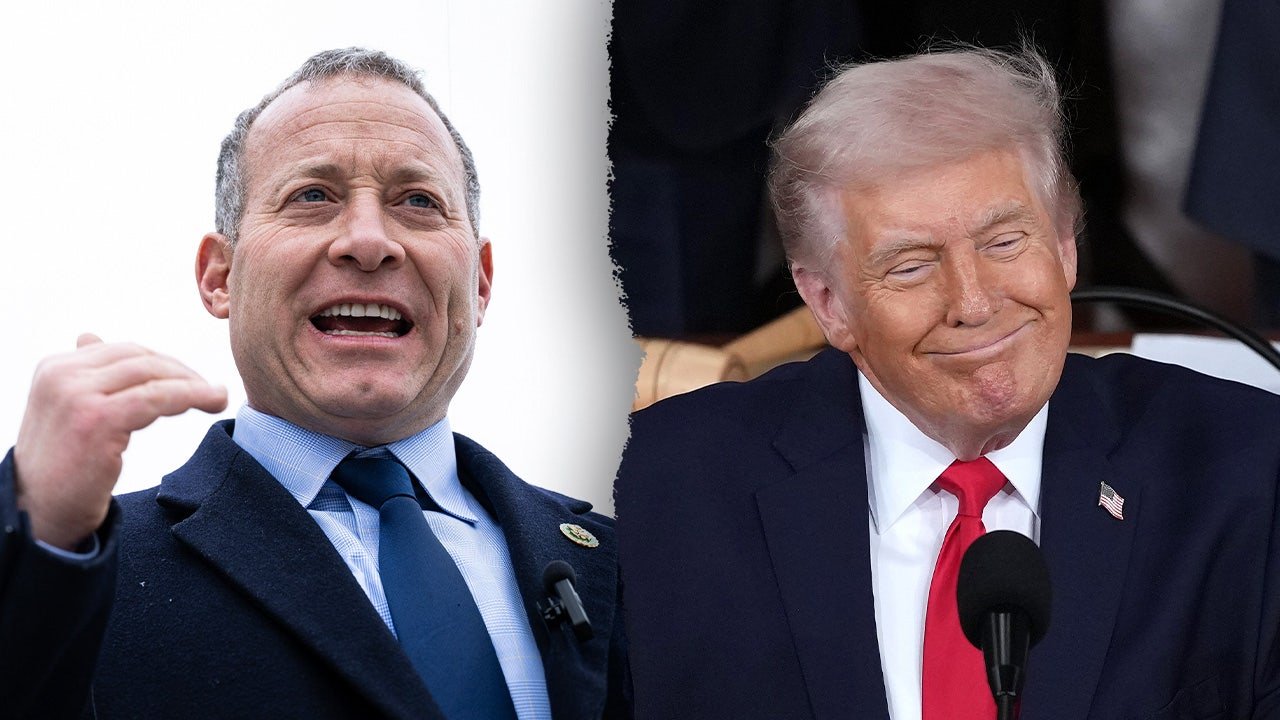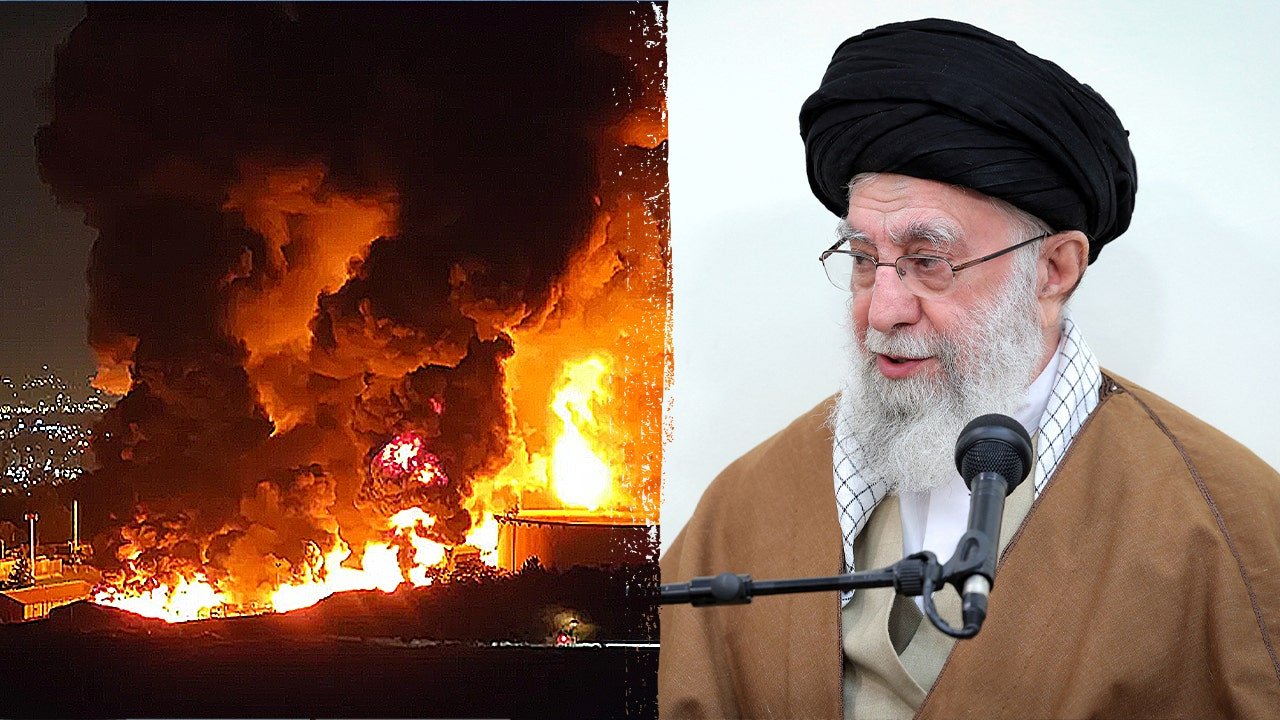INTERNACIONAL
Race against time: How Congress barely made July 4 deadline on ‘big, beautiful bill’

NEWYou can now listen to Fox News articles!
Football and basketball coaches are experts in clock management.
So are lawmakers.
Coaches are adept at either burning or saving just enough time on the clock to execute a play – or prevent the other team from doing so.
Congressional clock management is very different.
TRUMP $3.3T MEGABILL SETS HOUSE RECORD FOR LONGEST VOTE IN HISTORY
Whatever lawmakers say they will do – it will always take them a profoundly longer period of time in which to do it.
That’s why the temporal politics of passing President Donald Trump’s «big, beautiful bill» overwhelmed everyone who works on Capitol Hill over the past few weeks.
That ranges from the lawmakers themselves to the aides, journalists, Capitol custodians and U.S. Capitol Police officers.
To wit:
Congressional Republicans have churned through variations of frameworks and iterations of the big, beautiful bill since February. But things finally got serious when the House adopted its formal version of the package on May 22, beating the Memorial Day goal by four days.
There was chatter that the Senate would tackle the House’s package the week of June 9. Then that fell to the week of June 15. The idea was that the Senate would process its version of the bill that week and then allow the House to sync up during the week of June 22.
Then those hopes were dashed.
That’s to say nothing of the Senate at least voting to proceed to even start debate at the very end of the week of June 15.
Here’s what really happened. And it underscores just how protracted the process can be on Capitol Hill, especially with a very complicated and controversial piece of legislation.
On Monday, June 23, Republican senators talked about taking a procedural vote to launch debate on the big, beautiful bill as early as Wednesday or Thursday, June 25 or 26. Such a vote would require just 51 yeas. But the bill wasn’t ready. Republicans were still crafting and drafting the bill to comport with Senate budget rules. The GOP also aimed to write the legislation in a fashion to court 51 yeas to crack the procedural hurdle and formally start debate.
Midweek came and the Senate never took a procedural vote. Sens. Ron Johnson, R-Wis., and Thom Tillis, R-N.C., opposed starting debate on a bill that was not complete.
So midweek morphed into the weekend, and when the Senate convened on Saturday, June 28, Fox News was told the chamber would take a procedural vote to begin debate around 4 p.m. ET.
SENATE REPUBLICANS RAM TRUMP’S ‘BIG, BEAUTIFUL BILL’ THROUGH KEY TEST VOTE
Well, you guessed it.
The Senate did not trigger that vote until 7:31 p.m. Saturday. And the 15-minute vote turned into a three-hour and 38-minute affair. The Senate closed the vote at 11:09 p.m.
Saturday – with Vice President JD Vance nearby in case his services were necessary to break a tie.
They were not.
At least not on the dais.
But Vance played a pivotal role in negotiating with Johnson, Sen. Rick Scott, R-Fla., and others to greenlight the Senate starting on the bill.
However, Senate Minority Leader Chuck Schumer, D-N.Y., then compelled Senate clerks to read the entire 940-page bill out loud from the dais. That enterprise consumed just under 16 hours of floor time. The clerks – their voices cracking and hoarse – concluded a few minutes after 3 p.m. on Sunday. This marked the first time a senator required the clerks to verbally read a bill before the Senate since 2021.
So, once the clerks concluded their oratory, it was believed that the Senate might go all night with its marathon voting session – known as a «vote-a-rama» – and try to finish the bill sometime by dawn Monday.
But this is Congress time.
Senators didn’t even begin the vote-a-rama until 9:40 am Monday. Twelve hours later, Senate Majority Leader John Thune, R-S.D., suggested it was time to «start figuring out» a final group of amendments that were necessary to conclude the bill.
Some groaned at that notion. One senator told Fox News that 12 hours later was a little late in the game to «start figuring out» something of that magnitude.
The Senate then toiled throughout the night Monday and into Tuesday. Thune and the GOP leadership finally cut a deal with Sen. Lisa Murkowski, R-Alaska, on rural hospitals to marshal her vote. The Senate approved the bill late Tuesday morning after an all-night session. Vance was back to break the tie in what is called a «Van Halen» vote. The tally was 50-50 since three GOP senators defected. But Vance’s vote in favor made the roll call «51-50.»
For those who are uninitiated in the Van Halen discography, «5150» was Van Halen’s first album with new lead singer Sammy Hagar, supplanting David Lee Roth. It went to No. 1 on the Billboard charts.
Then, it was on to the House.
HOUSE ADVANCES TRUMP’S MASSIVE AGENDA BILL AFTER FREEDOM CAUCUS CAVES
The House Rules Committee serves as a gateway for legislation to head to the floor. It convened a meeting early Tuesday afternoon. The Senate would soon send its revamped version of the big, beautiful bill across the Capitol Dome for the House to align. The Rules Committee then proceeded to meet until around 1 a.m. Wednesday, prepping the bill for the floor.
That meant the House could vote by late Wednesday afternoon.
But there was a problem.
House GOP leaders discovered what they termed a «technical error» in the rule. The entire House must first approve the rule before debating legislation on the floor. So the House needed to vote on the fix first. That vote started early Wednesday afternoon – and continued for another seven hours and 31 minutes. That established a record for the longest roll call vote in House history, topping a vote of seven hours and 21 minutes in 2021.
Some Republicans weren’t at the Capitol. But they held the vote open to buy time to work on skeptical GOP members who may be holdouts.
And around 9:30 p.m. Wednesday, House Speaker Mike Johnson, R-La., decided to double-dog dare anyone who was against the bill to put their voting card where their mouth was. Republican leaders closed the «technical correction» vote and proceeded to a vote on the «rule.» If the House adopted the rule, it could formally debate the bill. The House was stuck if its members failed to approve the rule.
The tally board behind the dais in the House chamber populated relatively quickly. All 216 Democrats said no There were also four GOP no votes – and several who refused to vote yes. Republicans could only lose three votes and still pass the rule. Rep. Thomas Massie, R-Ky., was a yes on the rule – even though he opposed the bill. He then switched to no as the vote dragged on. However, Massie ultimately supported the rule in the end.
HAKEEM JEFFRIES BREAKS KEVIN MCCARTHY RECORD WHILE STALLING TRUMP’S ‘BIG, BEAUTIFUL BILL’
Reps. Victoria Spartz, R-Ind., Keith Self, R-Texas, Andrew Clyde, R-Ga., and Brian Fitzpatrick, R-Pa., were no votes throughout the vote. But around 1 a.m., there was movement. The holdouts and some of those who voted no met with Johnson and other GOP leaders. That seemed to pry loose the votes of the holdouts and opponents – except Fitzpatrick.
But there was a problem.
Rep. Scott Perry, R-Pa. – who had not voted – drove home to Pennsylvania. So everyone at the Capitol patiently waited for Perry to return. He did around 3:30 a.m. Thursday. Everyone but Fitzpatrick voted as a bloc in favor of the rule. The House had the votes to begin debate on the rule.
It looked as though the House might vote around daybreak on the actual bill itself.
But the office of House Minority Leader Hakeem Jeffries, D-N.Y., had told Fox News on Wednesday that Jeffries intended to speak for an hour or so at the end of debate. There’s a custom in the House where top leaders of both parties are yielded «a minute» to speak on the floor. But this is a «magic minute.» As a courtesy to those leaders, they speak as long as they want.
Jeffries began speaking just before 5 a.m. Thursday – and finally concluded eight hours and 45 minutes later just after 1:30 p.m. ET Thursday. Jeffries shattered the mark of eight hours and 32 minutes established by House Speaker Kevin McCarthy, R-Calif., in 2021. McCarthy set the record as minority leader.
So those House members hoping to hop an early morning flight and get home for July 4 would have to wait.
CLICK HERE TO GET THE FOX NEWS APP
Mike Johnson didn’t speak nearly as long as Jeffries. But he did observe that the late President Ronald Reagan once said that no speech should run longer than 20 minutes.
Johnson spoke for 23 minutes.
And then the House voted, finally passing the bill 218-214 at 2:31 p.m. Thursday. Fitzpatrick and Massie were the only GOP noes.
It is said that we never have enough time in life. And if you work on Capitol Hill, you’ll probably have even less thanks to congressional clock management.
INTERNACIONAL
Objetivo: Acabar con el régimen

Ese es el titular y ese es el sentido de los ataques coordinados de Israel y Estados Unidos que este 28 de febrero se han producido contra Irán: no buscan objetivos concretos, como la finalización de la carrera nuclear, o la destrucción de los centros de ensamblaje de los misíles balísticos, sino la caída completa del régimen.
La operación ‘Furia épica’, y su homólogo israelí ‘Rugido del León’ no son una reedición de las operaciones bélicas de junio pasado: el ‘León Creciente’ y su par americano, el ‘Martillo de medianoche”. En aquella ocasión se buscaba amedentrar al régimen, herir sus estructuras bélicas y, sobretodo, atacar las instalaciones nucleares de Natanz, Isafhan y la impenetrable Fordow, después de la constatación del nivel de enriquecimiento crítico del uranio que había conseguido Irán. Fue una operación quirúrgica y, por ende, limitada. Pero esta vez, en palabras del propio Trump, la intención es integral: destruir la industria de mísiles iraní, aniquilar su potencial armado, aniquilar toda opción nuclear, destruir la capacidad de desestabilización de sus aliados terroristas y, en definitiva, eliminar completamente la amenaza que supone el régimen de los ayatolas. Es por ello que Trump ha acabado su vídeo de ocho minutos en Truth Social asegurando al pueblo iraní que “la hora de su libertad está a su alcance” y animándolo a tomar las riendas de su destino. Por si hubiera alguna duda, el primer objetivo del ataque ha sido matar al líder supremo Alí Khamenei, cuya situación al momento de escribir el articulo, aún es confusa.
Si esa es la premisa, la caída del régimen de los ayatolás que aterroriza a su población y desestabiliza a toda la región desde 1978, cabe preguntarse si realmente es un objetivo viable y a qué plazo. Sobretodo porque Irán no es Venezuela: tiene capacidad militar poderosa; su guardia revolucionaria y el resto de cuerpos militares y policiales son compactos y están muy bien entrenados; está situado en un zona de enorme valor geoestratégico, capaz de crear grandes sacudidas económicas; tiene objetivos americanos y al propio Israel al alcance de sus misiles, y sus proxies, pueden atacar a sus enemigos desde muchas posiciones. Con todo ello, no parece que pueda tratarse de una guerra corta (de momento, fuentes de seguridad israelí hablan de más de una semana de ataques), aunque la voluntad americana sea acortarla al máximo y centrarla en los ataques aéreos. Pero si el objetivo es la caída del régimen, ¿será suficiente la batalla aérea? Sin duda a nadie le interesa una guerra con infantería, y menos a Trump, que podría encharcar a Estados Unidos en un nuevo Afganistán. No hay que olvidar que Irán tiene 650.000 efectivos activos, una de las infanterías más grandes del mundo. Pero, si imaginar una guerra con infantería es un pésimo propósito, descartarla es imprudente.
Con todo, la superioridad militar de americanos e israelíes en mar y aire está fuera de toda duda y por tanto es imaginable que consigan colapsar el régimen destruyendo todos sus centros estratégicos, tanto militares, como políticos. Lo cual no significa que Irán no pueda ser letal en las próximas horas y días. El éxito militar de USA e Israel se da por seguro. El cuándo se produce y qué consecuencias políticas tiene, es más difuso.
En este sentido, ¿es el momento de atacar Irán? Sin ninguna duda. Primero, porque es el punto final de la guerra que empezó el 7 de octubre de 2023, con la masacre de Hamás en Israel, auspiciada por los ayatollahas. A partir de aquel punto de inflexión, Irán pasó, de ser el enemigo a vigilar, a ser el enemigo a abatir, no solo para Israel, sinó para otros países preocupados por la carrera nuclear y por el potencial que Irán había aconseguido a través de sus proxies: chiitas iraquíes, la Siria de los Asad, el Hezbollah en el Líbano, los huties del Yemen, y los grupos terroristas que actuaban en Gaza. Y ello sin contar con la penetración iraní en América Latina. No había opción para la negociación. Pero la guerra con Irán solo podía producirse si se ocurrían tres grandes sacudidas: si Israel ganaba su propia guerra en el Líbano contra Hezbollah y en Gaza contra Hamás; si caía el régimen sirio; y si llegaba Trump a la Casa Blanca. Todo pasó, y ahora està ocurriendo lo que entonces ya estaba predestinado.
Pero hay más motivos que han desencadenado la decisión final. Por un lado, la constatación de que China y Rusia no tienen ninguna intención de intervenir. Al contrario, necesitan una situación de estabilidad en la región. Por otro lado, la mayoría de países de la región quieren pasar del momento Irán al momento Acuerdos de Abraham, y al consecuente potencial económico que puede generar. Finalmente, la grave crisis económica del país sumada a la extraordinaria y heroica revuelta de los iraníes, cuya valentía han pagado con miles de muertos, han mostrado la extrema debilidad de un régimen enloquecido y delirante que se aguanta por el terror, con la mayoría de la población en su contra. Con un añadido final: la aparición de Reza Pahlavi, cuya popularidad lo convierte en posible referente para el proceso democrático. Estados Unidos no tiene una Delcy en Irán, pero con Pahlavi tiene un puente de transición.
Conclusiones finales, aunque precarias, dada la volatilidad de la situación: la guerra es total y tiene como objetivo el final del regiment de lo ayatollas; Estados Unidos e Israel han desencadenado una fuerza militar colosal, que Irán no puede vencer; la guerra puede durar más de lo que quisiera Trump, porque el régimen la vivirá como una “guerra existencial” e intentará morir matando; es el gran momento de la oposición al régimen, que siempre consideró necesaria la intervención para poder derrocarlo. Finalmente, lo más importante: si cae el régimen, además de liberar al pueblo persa, habrá ganado la causa de la mujer, la causa de los derechos humanos y la siempre eterna y frágil causa de la libertad.
X: @RaholaOficial
Web:
Instagram: pilar_rahola/
Business,Civil Conflict,Demonstrations,Riots,Corporate Events,Europe,Civil Unrest
INTERNACIONAL
Democrats buck party leaders to defend Trump’s ‘decisive action’ on Iran

NEWYou can now listen to Fox News articles!
President Donald Trump’s joint strikes on Iran are exposing a divide in both parties, as several Democrats come to the president’s defense while a handful of Republicans question his constitutional authority.
Trump announced U.S. and Israeli forces targeted Iranian leadership and military sites in the early hours of Saturday morning, catching millions of Americans — and the majority of lawmakers in Congress — by surprise.
A handful of House Democrats are justifying the operation, bucking most of their party, who are calling the operation a reckless and illegal action. On the other hand, at least three Republican lawmakers are signaling that the news gave them some pause as of Saturday morning.
Rep. Greg Landsman, D-Ohio, said that the strikes «are targeting military infrastructure —- with warnings to Iranian civilians to take shelter away from these military targets.»
Democrats like Rep. Josh Gottheimer are breaking from their party to justify President Donald Trump’s joint operation with Israel. (Graeme Sloan/Bloomberg via Getty Images; Andrew Harnik/Getty Images)
«I want a lasting peace for everyone in the region — from the Iranian people to the Lebanese, Palestinians, Syrians, Iraqis, Jordanians, and Israelis. I hope these targeted strikes on the Iranian regime’s military assets ends the regime’s mayhem and bloodshed and makes way for this lasting peace in the region,» Landsman said.
«Thank you to our brave service members who are leading this effort, and I pray their work will finally free the people of Iran and those in the region from more violence or war.»
Reps. Tom Suozzi, D-N.Y., and Josh Gottheimer, D-N.J., similarly put the onus on Iran, as did Sens. Jacky Rosen, D-Nev., and John Fetterman, D-Pa.
ISRAEL LAUNCHES PREEMPTIVE STRIKE AGAINST IRAN, DEFENSE MINISTER SAYS
On the Republican side, Reps. Warren Davidson, R-Ohio, Thomas Massie, R-Ky., and Sen. Rand Paul, R-Ky., are concerned about how actions against Iran could run afoul of Congress’ own constitutional authority.
«We need a government small enough to fit within the Constitution. We need a government effective enough to solve problems and serve its own people. Or, we need a new Constitution,» Davidson posted on X.
When another user asked if he supported Trump’s actions against Iran, Davidson replied, «No. War requires congressional authorization.»

Rep. Thomas Massie, R-Ky., questions Attorney General Pam Bondi before a House Judiciary Committee hearing on Capitol Hill in Washington, Feb. 11, 2026. (Robert Schmidt/AFP via Getty)
ISRAEL TARGETS IRAN’S SUPREME LEADER IN SWEEPING STRIKES AS US JOINS ‘OPERATION EPIC FURY’
Massie, a longtime critic of foreign intervention, went so far as to introduce a resolution alongside Rep. Ro Khanna, D-Calif., to rein in Trump’s war powers. House Democrats are demanding a vote on that resolution as soon as next week.
Landsman told NOTUS that he would vote against such a measure if it came to the House floor.
Rep. Josh Gottheimer, D-N.J., while similarly praising the military’s moves, refused to tell Fox News Digital if he would support the resolution via a spokesperson.
«Today, the United States, with our key democratic ally Israel, took decisive action to defend our national security, fight terror, protect our allies, and stand with the Iranian people who have been massacred in the streets for demanding freedom from the murderous Iranian regime,» Gottheimer said in a statement.
«I applaud the extraordinary bravery and professionalism of our servicemembers and pray for their safety as Iran and its terrorist proxies retaliate against American bases and our partners in the region.»
He, like Suozzi and Rosen, called for a classified briefing on the operation’s details.
GULF STATES CONDEMN IRANIAN RETALIATORY STRIKES ON THEIR TERRITORIES FOLLOWING US-ISRAELI OPERATION
«I agree with the President’s objectives that Iran can never be allowed to obtain nuclear capabilities. The President must now clearly define the national security objective and articulate his plan to avoid another costly, prolonged war in the Middle East,» Suozzi said in his own statement.
Fetterman, meanwhile, has been among the Democrats most full-throated in his support.
«President Trump has been willing to do what’s right and necessary to produce real peace in the region. God bless the United States, our great military, and Israel,» he posted on X early Saturday morning, among the first lawmakers to sound off.

A person holds an image of Iran’s Supreme Leader Ayatollah Ali Khamenei as Iranian demonstrators protest against the U.S.-Israeli strikes, in Tehran, Iran, Feb. 28, 2026. (Majid Asgaripour/WANA (West Asia News Agency) via Reuters)
He said of the war powers vote, «I’m a hard no. My vote is Operation Epic Fury.»
It’s a stark contrast to the majority of Democratic lawmakers who have lambasted Trump for not getting authorization from Congress before the strikes.
CLICK HERE TO DOWNLOAD THE FOX NEWS APP
House Minority Leader Hakeem Jeffries, D-N.Y., accused Trump of moving to «abandon diplomacy and launch a massive military attack has left American troops vulnerable to Iran’s retaliatory actions.»
In the Senate, Minority Leader Chuck Schumer, D-N.Y., said, «Confronting Iran’s malign regional activities, nuclear ambitions, and harsh oppression of the Iranian people demands American strength, resolve, regional coordination, and strategic clarity. Unfortunately, President Trump’s fitful cycles of lashing out and risking wider conflict are not a viable strategy.»
congress,war with iran,house of representatives politics,foreign policy senate,donald trump,politics
INTERNACIONAL
Did they get him? Khamenei’s fate remains unknown after Israel strike levels his compound

NEWYou can now listen to Fox News articles!
As the smoke was still clearing over Tehran, one question dominated the region and Washington alike: Did they get him?
In the immediate aftermath of the Israel-U.S. strikes, with the Israeli Air Force targeting senior Iranian leadership infrastructure, rumors swirled that Ayatollah Ali Khamenei, Iran’s 86-year-old supreme leader, had been killed.
Satellite images showed heavy damage to Ayatollah Ali Khamenei’s fortified compound, including buildings believed to house his residence and the so-called House of Leadership. Parts of the complex appeared reduced to rubble.
Regional reports indicated a high-level meeting of Khamenei’s top lieutenants may have been underway when the strike hit. Iranian semi-official media also reported missiles struck near the presidential palace and other leadership sites north of the capital.
Iran’s Supreme Leader Khamenei makes first public appearance in weeks with fresh U.S. threats. (Office of the Iranian Supreme Leader Credit/ASSOCIATED PRESS)
Addressing the nation on Saturday, Prime Minister Benjamin Netanyahu said in Hebrew, «There are more and more signs indicating Khamenei is gone.»
Israeli officials told Fox News Digital they were still assessing the results and said it was too early to confirm the fate of the 86-year-old supreme leader. They did not rule out the possibility that he was killed.
Iranian officials, however, insisted the country’s leadership — including Khamenei and President Masoud Pezeshkian — remained safe, according to The Guardian, despite what they described as an assassination attempt. Meanwhile, a spokesperson for Iran’s Ministry of Foreign Affairs told the BBC that he was not in a position to confirm whether Ayatollah Ali Khamenei had been eliminated.
IRAN FIRES MISSILES AT US BASES ACROSS MIDDLE EAST AFTER AMERICAN STRIKES ON NUCLEAR, IRGC SITES

In this picture released by an official website of the office of the Iranian supreme leader, Supreme Leader Ayatollah Ali Khamenei stands as army air force staff salute at the start of their meeting in Tehran, Iran, Friday, Feb. 8, 2019. Khamenei is defending «Death to America» chants that are standard fare at anti-U.S. rallies across Iran but says the chanting is aimed at America’s leaders and not its people. (Office of the Iranian Supreme Leader via AP)
The long-serving cleric has survived decades of internal unrest, assassination plots and foreign pressure. He rarely appears in public without layers of security and is believed to operate through a tightly controlled network of loyalists embedded across Iran’s military, intelligence and political institutions.
In an exclusive Fox News Digital report earlier this week, researchers described how Khamenei runs what amounts to a parallel state within Iran’s formal government structure.
«The Bayt is the hidden nerve center of the regime in Iran… it operates as a state within a state,» Kasra Aarabi, director of Islamic Revolutionary Guard Corps (IRGC) research at United Against Nuclear Iran (UANI), told Fox News Digital.
IRAN COULD ‘ACTIVATE’ HEZBOLLAH IF US TARGETS REGIME, TRUMP’S INNER CIRCLE TO DECIDE: EXPERT

Smoke rises on the skyline after an explosion in Tehran, Iran, Saturday, Feb. 28, 2026. (AP Photo/Vahid Salemi)
Even if Khamenei himself were removed, Aarabi warned, the institutional machinery he built — involving roughly 4,000 core staff and a broader network of tens of thousands — could continue functioning.
«Even if he is eliminated, the Bayt as an institution enables the Supreme Leader to function,» Aarabi said. «Think of the Supreme Leader as an institution rather than just a single individual.»
That reality complicates the picture.
For decades, Khamenei has positioned himself not merely as a political leader but as the apex of a system designed to survive shocks — whether from protests at home or military pressure abroad.
The 86-year-old cleric has faced repeated waves of unrest, including mass protests in 2009, 2022 and again in early 2026. Each time, his regime cracked down forcefully, consolidating control rather than fracturing.
He has also weathered years of covert operations, cyber campaigns and targeted strikes against key Iranian figures across the region.
Still, the scale of the latest strike appears unprecedented.
If confirmed dead, Khamenei’s killing would mark the most significant decapitation of Iranian leadership since the 1979 revolution. It would also raise immediate questions about succession inside a system he carefully engineered to avoid sudden collapse.
CLICK HERE TO DOWNLOAD THE FOX NEWS APP

A person holds an image of Iran’s Supreme Leader Ayatollah Ali Khamenei as Iranian demonstrators protest against the U.S.-Israeli strikes, in Tehran, Iran, Feb. 28, 2026. (Majid Asgaripour/WANA (West Asia News Agency) via Reuters)
If he survived, it would reinforce his reputation for resilience — and underscore how difficult it is to eliminate the core of Iran’s power structure.
For now, officials say assessments are ongoing, and the question may be answered in the very near future.
ali khamenei,war with iran,iran,israel,bombings

 ECONOMIA3 días ago
ECONOMIA3 días agoCrisis en la industria: otra multinacional se achica y cierra una planta en la Argentina

 CHIMENTOS3 días ago
CHIMENTOS3 días agoCatherine Fulop contó el difícil momento que atraviesa su madre en Venezuela: “Está postrada”

 CHIMENTOS2 días ago
CHIMENTOS2 días agoAlarma por la salud de Divina Gloria tras salir de Gran Hermano: “La internaron directamente en terapia intensiva”















